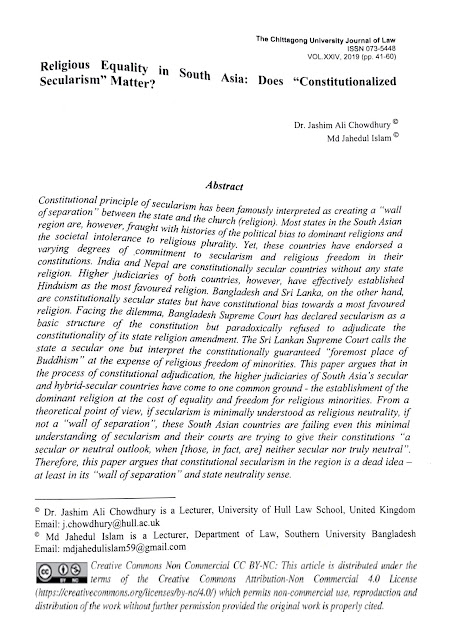Religious Equality in South Asia: Does “Constitutionalised Secularism” Matter?
Dr Jashim Ali Chowdhury
Md Jahedul Islam
Published in The Chittagong University Journal of Law, Volume XXIV 2019 (Published in June 2023) pp 41-60
Abstract
The constitutional principle of Secularism has been famously interpreted as creating a “wall of separation” between the state and the church (religion). Most states in the South Asian region are, however, fraught with histories of political bias toward dominant religions and the societal intolerance of religious plurality. Yet, these countries have endorsed a varying degree of commitment to secularism and religious freedom in their constitutions. India and Nepal are constitutionally secular countries without any state religion. Higher judiciaries of both countries, however, have effectively established Hinduism as the most favoured religion. Bangladesh and Sri Lanka, on the other hand, are constitutionally secular states but have a constitutional bias towards a state or most favoured religion. Facing the dilemma, Bangladesh Supreme Court has declared secularism as a basic structure of the constitution but paradoxically refused to adjudicate the constitutionality of its state religion amendment. The Sri Lankan Supreme Court calls the state a secular one but interprets the constitutionally guaranteed “foremost place of Buddhism” at the expense of the religious freedom of minorities. This paper argues that in the process of constitutional adjudication, the higher judiciaries of South Asia’s secular and hybrid-secular countries have come to one common ground - the establishment of the dominant religion at the cost of equality and freedom for religious minorities. From a theoretical point of view, if secularism is minimally understood as religious neutrality, if not a “wall of separation”, these South Asian countries are failing even this minimal understanding of secularism, and their courts are trying to give their constitutions “a secular or neutral outlook, when [those, in fact, are] neither secular nor truly neutral”. Therefore, this paper argues that constitutional secularism in the region is a dead idea – at least in its “wall of separation” and state neutrality sense.




No comments:
Post a Comment